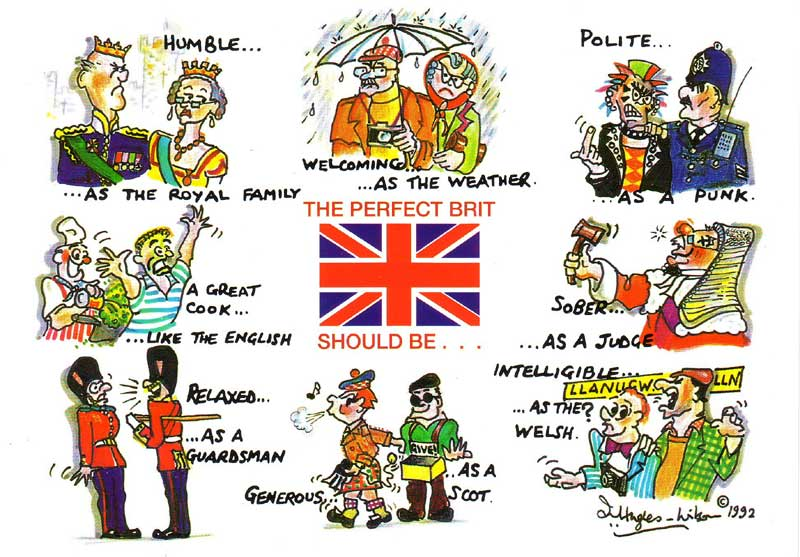Unit 8. NATIONAL STEREOTYPES
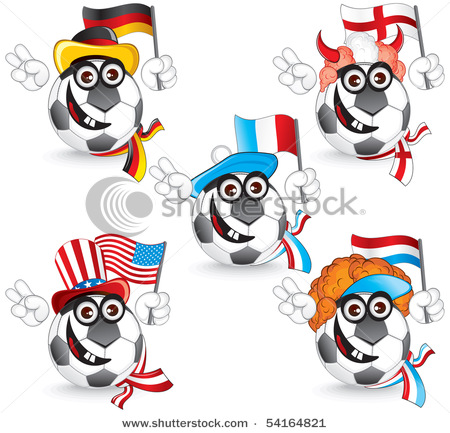
8.1. Listening Development
Assignment 1. Listen to the recording to Unit 8.
- At the beginning of a story a description of a man is given. What is his name? What was his job? What did he look like? What was his typical way of behaviour?
- A description of a place is given then. What place is it? What did it look like?
- How did the main hero deal with difficult customers? What was the incident which made the author think he disliked him? What changed his mind later?
- What was the surprising news when the author came back a couple of years later? Why was he surprised?
- What did he find out afterwards? Why did the misunderstanding happen?
Assignment 2. Listen to the recording to Unit 8 again. Summarize in short what stereotypes are mentioned and how they are broken. Were there any stereotypes you had broken after listening to the story?
8.2. Vocabulary Enrichment
Assignment 1. Complete the following table. Use a dictionary for any of the words you don’t know. Some of these nationality adjectives, as well as the nouns, have a change in stress and/or pronunciation from the name of the country. Make sure you can pronounce them.
a. Country: I live in England.
b. Adjective: He reads English literature.
c. Noun: She is an Englishwoman.
| COUNTRY | ADJECTIVE | NOUN |
| Argentina | Argentinean | (an/the)Argentinean(s) |
| Austria | Austrian | the Austrians |
| Australia | ||
| Bangladesh | ||
| The Republic of Belarus | ||
| Belgium | ||
| Botswana | ||
| Brazil | ||
| Britain |
| COUNTRY | ADJECTIVE | NOUN |
| Cambodia | ||
| Chile | ||
| China | ||
| Colombia | ||
| Croatia | ||
| The Czech Republic | ||
| Cyprus | ||
| Denmark | ||
| England | ||
| Finland |
| COUNTRY | ADJECTIVE | NOUN |
| Greece | ||
| Holland | ||
| Hungary | ||
| Iceland | ||
| India | ||
| Indonesia | ||
| Iran | ||
| Iraq | ||
| Ireland | ||
| Israel |
| COUNTRY | ADJECTIVE | NOUN |
| Jamaica | ||
| Japan | ||
| Lebanon | ||
| Lybia | ||
| Madagascar | ||
| Mexico | ||
| Monaco | ||
| Montenegro | ||
| Morocco | ||
| Norway | ||
| Peru | ||
| the Philippines | ||
| Poland |
| COUNTRY | ADJECTIVE | NOUN |
| Portugal | ||
| Rumania | ||
| Saudi Arabia | ||
| Scotland | ||
| Serbia | ||
| the Slovak Republic | ||
| Sweden | ||
| Switzerland | ||
| Thailand | ||
| Tunisia | ||
| Turkey | ||
| Vietnam | ||
| Wales |
Assignment 2. Look at the list of adjectives below and mark them as + (adjectives denoting a strength), and – (adjectives denoting a weakness). Then try to give their opposites.
| ADJECTIVE | +/– | ADJECTIVE WITH AN OPPOSITE MEANING |
| ambitious | ||
| arrogant | ||
| bullying | ||
| caring | ||
| casual | ||
| competitive | ||
| confident | ||
| conservative | ||
| controlling | ||
| easy-going | ||
| emotional | ||
| enterprising | ||
| enthusiastic |
| ADJECTIVE | +/– | ADJECTIVE WITH AN OPPOSITE MEANING |
| focused | ||
| forceful | ||
| formal | ||
| friendly | ||
| frivolous | ||
| fun-loving | ||
| generous | ||
| hard-working | ||
| helpful | ||
| hospitable | ||
| humorous | ||
| indecisive | ||
| interfering | ||
| irresponsible | ||
| lazy | ||
| nationalistic | ||
| nosy |
| ADJECTIVE | +/– | ADJECTIVE WITH AN OPPOSITE MEANING |
| obsessive | ||
| opportunistic | ||
| outgoing | ||
| prudent | ||
| punctual | ||
| quiet | ||
| reserved | ||
| respectful | ||
| romantic | ||
| ruthless | ||
| serious | ||
| sociable | ||
| sophisticated | ||
| supportive | ||
| talkative | ||
| tolerant |
Assignment 3. Look at the list of adjectives given in Assignment 2 and write out the adjectives that may characterize the Belarusian Character.
The Belarusians are generally ...
Assignment 4. Match the following terms to their definitions.
|
|
Assignment 5. Read the following abstract on stereotypes and fill in the gaps with the words given in the table below. In some cases you may need to use the same word several times.
generalizations assumptions prejudice beliefs appreciate
stereotypes harmful hostility generalization identify
... can be either positive or negative, but they are all unfair and misleading. In general, stereotypes reduce individuals to a rigid, inflexible image; they do not account for the fact that human beings are complex and multidimensional, with unique .... Stereotypes suggest that people or groups of people are the same, when, in fact, they are quite different. Stereotypes about human beings tend to dehumanize people, placing all members of a group into one, simple category.
Although ..., the basis for stereotyping, represent a natural part of the learning process, when they are directed at human beings, they can be dangerous and .... When we stereotype people, we prejudge them; we assume that all people in a group have the same .... This form of blind categorization leads to false ... about people and causes misunderstandings, ..., abusive behaviors, conflicts, ..., and .... For example, if we are walking through a park late at night and encounter three senior citizens wearing fur coats and walking with canes, we may not feel as threatened as if we were met by three high school-aged boys wearing leather jackets. Why is this so? We have made a ... in each case. These generalizations have their roots in experiences we have had ourselves, read about in books and magazines, seen in movies or television, or have had related to us by friends and family. In many cases, these stereotypical generalizations are reasonably .... Yet, in virtually every case, we are resorting to prejudice by ascribing characteristics about a person based on a stereotype, without knowledge of the total facts.
Civil societies can only thrive when damaging stereotypes are broken down. The difficulty is that stereotypes are sometimes hard to recognize because they are fixed .... Learning to ... stereotypes is one of the first steps we must take to build a civil society. After identifying stereotypes, we can work toward ... them from society. When stereotypes are eliminated, it will be easier to acknowledge and ... individual differences. When we live in a society that is open to cultural diversity and that values the contributions of all society members – regardless of cultural and ethnic backgrounds, race, life styles, and belief – we will be one step closer to living in a civil society.
8.3. Reading Improvement
Assignment. Read the following abstract from The Cultural Imperative by R.D.Lewis. Then write a similar passage on how you see the Belarusians (the Belarusians through Belarusian Eyes) outlining the main points: Values and Core Beliefs, Communication, Social and Business Behavior, Other (at your discretion).
The English and the French
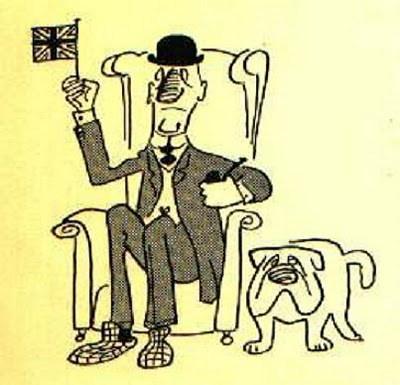
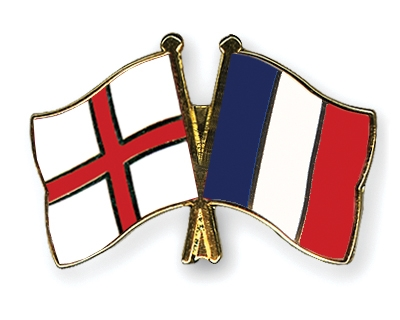

The English through English Eyes
Values and Core Beliefs. The English are a calm, reasonable people who believe in fair play, good manners, old traditions, the monarchy, cricket, soccer, rugby, tennis, and the Church of England. Fond of dogs, cats, horses, sheepdog trials, queuing, and garden parties, we are casual and laid-back, can laugh at ourselves, and are occasionally eccentric. We support underdogs and have kind hearts that are concealed by a reluctance to appear emotional. We are reliable in a crisis, maintaining a "stiff upper lip." We admire reserve and conservatism and are occasionally vague. We often think laterally and are frequently inventive.
Communication. When communicating with others, the golden rule is "Do not rock the boat." Boasting is taboo; understatement and modesty show good form. Being too frank or brutally honest is not always appropriate. Humor, stalling, even a sprinkling of white lies emphasize diplomacy at the expense of truth. Coded speech is a good way to convey feelings without revealing criticism, anger, disappointment, or even approval too directly. We are good listeners and like to offer useful feedback and debate.
Social and Business Behavior. The English invented Good Manners, which peaked during the reign of Queen Victoria. We avoid voicing strong opinions and prefer to influence events through behind-the-scenes connections.
Initial formality at business meetings soon gives way to informality and first names. Humor and storytelling are necessary ingredients in business. As managers we are diplomatic, tactful, laid-back, casual, reasonable, helpful, willing to compromise, and inventive. We conduct business with grace, style, wit, eloquence, and self-possession. We regard meetings as occasions to seek agreement rather than to issue instructions.
Other. Punctuality is admired, but one needn't arrive on the dot. Distance of comfort is 1.2 meters. The continuing polarization of society constitutes an English "cultural black hole" (see chapter 6).
The English through French Eyes
Values and Core Beliefs. The English are a rather closed, undemonstrative lot who believe they have a monopoly on impartiality and good manners. They are somewhat old-fashioned and cling to old traditions like the monarchy, cricket, croquet, country dancing, and "five o'clock tea." They are slow to modernize and in the last twenty years have fallen behind the French in technology. They are reluctant members of the European Union and may one day be thrown out. Their famous quality of reserve often leads them to be obtuse in international exchanges. They are obstinate and often very cool with Latins in general, the French in particular. They have shared a lot of history with France, but they don't seem to have learned much from it. They lack panache.
Communication. Unlike the French, who are direct and precise communicators, the English are woolly, unclear, and often devious. They think slowly and reply to our questions with phrases such as "I'll have to think about it," "It's a moot point," or "I'm not quite with you on that one." They rarely say what they mean (and often say the opposite of what they mean). They are condescending toward French people and tell us funny stories to distract us. They avoid precision or commitment.
Social and Business Behavior. The English are much less formal than we French, often wanting to use first names much earlier than we do. They become familiar too soon and lack respect for our position. They think they dress well, but we know better. They pride themselves on their table manners but hold a fork the wrong way up and think we are uncivilized when we (sensibly) wipe gravy off a plate with a piece of bread.
They want to follow agendas strictly and dislike discussing important points that we want to revisit. They say things like "That was settled earlier." They like to appear laid-back during business meetings but often fail to give adequate attention to important matters. They pretend business is a kind of game that can be won by excelling at humor. They are always trying to pin us down ("Could we please write down what we have agreed upon?") when we obviously wish to discuss vital issues further.
Other. The British stand well away from interlocutors and seem uncomfortable when Latins get close to them. They shake hands less than we do. They like frequent "tea breaks."
The Americans and the Japanese
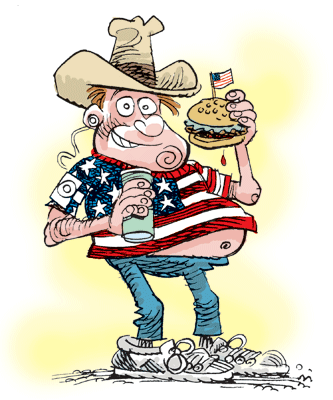
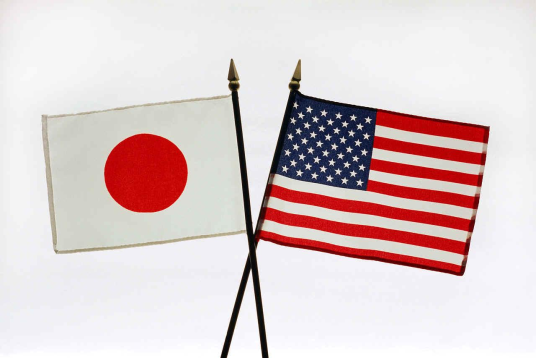

Americans through American Eyes
Values and Core Beliefs. We Americans – the most courageous and dynamic people of the twentieth century – have a lot going for us. Lucky to have been born in God's Country, with its protected geographical position and almost unlimited resources, we have certainly made the best of our good fortune. By conquering a vast continent and taming a wilderness, we have created the world's biggest economy, lead all others in advanced technology, and are the undisputed champions of democracy and free trade. Imbued with the frontier spirit, we Americans work hard, play hard, move fast, and are pragmatic, optimistic, and future-oriented. We seek equality and individual liberty in a land where honest toil makes anything possible and where anyone can become president. The visible achievements and prosperity that make the United States the envy of other lands confirm the reality of the American Dream.
Communication. Americans communicate in a frank, direct manner: we "spell it out," "tell it like it is," and "lay our cards on the table." In other words, we keep things simple and get to the point. We dislike devious discussion, though we may lace our message with humor. The communicative style is friendly from the outset, accompanied by smiles and the use of first names. Disagreements are expressed openly, without beating around the bush. We listen well, especially for technical details.
Social and Business Behavior. Because of the nature of the country's social history, Americans have many easy strategies for meeting strangers. We make friends quickly, seek early trust, and are relaxed about manners and dress. We pride ourselves on being the world's best small talkers. In the United States, different levels of society mingle easily; European-style snobbery is rare.
Americans are the world's best businesspeople – the U.S. economy was dominant for most of the twentieth century and shows few signs of flagging. Among the reasons for this success are the willingness of Americans to think big and to take risks. We are good at sniffing out business opportunities, we move quickly to propose deals, and we put our money where our mouth is. Hardworking and persistent, we place emphasis on competence, and specialists may have their say, free of the hierarchical constraints common in other cultures. Contracts and commitments are binding, and American businesspeople normally stick to what has been agreed. Compared with many nationalities, we Americans work at a breakneck pace and take few holidays when there is a task to complete.
Other. We Americans feel strongly about our mission as world policeman and guarantor of basic freedoms. Our military can be called to arms quickly to defend democracy or trade routes, and at the turn of the twenty-first century, we remain the only true superpower.
Americans through Japanese Eyes
Values and Core Beliefs. Americans are big, not only in their physical size but also in the way they think. Their houses are big, their cars are big, their ranches have thousands of acres. Biggest is generally considered best. They have led the world economically, politically, and militarily since 1945, and we Japanese have no quarrel with that. We are happy to be number two. Americans are well-meaning people who charge ahead with their policies, often dragging us along in their wake. It is good to have them as an ally, but we would be even happier if they tried to understand us better and learned the importance efface.
Communication. Americans always spell out their intentions in quite loud English from the outset. When we don't understand the first time, they spell it out again in even louder English. They can't understand why we are so quiet, and when we lapse into silence, it seems to make them nervous. They then speak again, even though it's our turn. They think we are devious because we are less direct than they are. They often call us "inscrutable," but really, they ought to "scrute" more.
Social and Business Behavior. They are immediately very friendly and open with complete strangers, pumping hands heartily (even violently) and saying they trust us. They are skilled at making small talk at cocktail parties, equaling the British and Canadians in this respect. We prefer restful silence, so we just drink and smile, but they are bigger drinkers than we are. We take them out to elegant restaurants, but they often gobble up their food quickly without showing due appreciation of our porcelain, table and food arrangements, and flowers. We notice they have trouble sitting on the floor. It must be their long legs.
When negotiating, Americans come straight to the point and ask us, "Do we have a deal?" when in fact we may be several months away from making a decision. They are quite happy airing differences of opinion in public, which is not at all our custom. They even differ in opinion among themselves and argue in front of us. They never spend a long enough time in Japan to set up a deal properly, always saying they have a plane to catch. When we know their departure time, we are able to use this knowledge to pressure them with last-minute changes. They seem to have no patience (compared with Asians) and do not understand how long it takes us to achieve a proper consensus. They honor their commitments but are unable to see the advantage of renegotiating contract under certain circumstances. If we break a contract, they take us to court, even though we are good customers. They have more lawyers than we have soldiers!
Other. In spite of frequent misunderstandings and mutual snipping about protectionism, we see that U.S.-Japan trade is the biggest bilateral commerce the world has ever seen.
From The Cultural Imperative by R. D. Lewis
8.4. Writing Enhancement
Assignment 1. Make up a questionnaire “How culturally aware are you?”about a nation you know well.
Assignment 2. Choose one of the following topics to write an essay. Make use of the active vocabulary list.
“Close-fisted Scotchman!” Johnson cried (from Ambrose Bierce’s poetry). Would you cry the same? What might be the advantages and disadvantages of having a Scottish friend?
Your friends are considering emigrating to Great Britain. You are not quite sure it is a good idea. Outline advantages and disadvantages of this step.
“The English are nothing but snobbish perfectionists”. Do you agree or disagree with this statement? Give arguments and illustrate with examples.
“An Irishman is the only man in the world who will step over the bodies of a dozen naked women to get to a bottle of stout.” Do you consider this statement to be a truthful image or an imaginary stereotype? Discuss.
Most people do not fit their national stereotypes. Can you prove or refute this statement providing arguments and illustrating your point of view with examples?
Travel is the only way to foster open-mindedness and eliminate xenophobia. Write an essay saying whether you agree or disagree with this statement.
If you were to chose a place to live, which country would it be and why?
The world might be a safer place to live in if there were not so many differences between the nationalities and cultures.
Globalization brings the cultures together. Meanwhile it is doubtful that they could achieve total understanding and thus, consensus. What obstacles can there be in cross-cultural communication, and how can they be tackled?
The representatives of different culture very often find it difficult to come to a consensus. Why is it and what can be done about it?
There should be a special course at school and university teaching every student cross-cultural issues. Are you for and against it? Back up your opinion with arguments.
Given the names of O’Donnel and MacKenzy, which part of the world do you think these people come from? Which problems might they have with the Belarusian culture? What might they miss from their own culture while living in our country?
Given the names of Asfar and Muhhammad, which part of the world do you think these people come from? Which problems might they have with the British culture? What might they miss from their own culture while living in the UK / the States?
Given the names of Tarasevich and Khvedchenya, which part of the world do you think these people come from? Which problems might they have with a foreign culture you are familiar with? What might they miss from their own culture while living in this country?
Stereotyping does more harm than good. Agree or disagree with this statement giving your arguments and examples.
There are stereotypes of stereotypes. In fact, stereotypes are much more reliable than the researchers in social anthropology claim. Discuss and express your point of view.
Jokes give a vivid and accurate descriptions of nationalities and their traits, they can be trusted to give a precise and objective mirror image of national propensities. Do you agree with this statement? Give an extensive answer.
Having an encounter with a new culture is like seeing just the tip of an iceberg. How can a Newby to a foreign country find out about the cultural aspects which are below the waterline, and thus avoid making a ‘faux pas’.
8.5. Speaking Reinforcement
Assignment 1. Get ready to discuss the following questions in small groups.
- What are stereotypes and how do they affect people's lives?
- Can you think of any events in history that were influenced by stereotypes and biases?
- How do people learn to make stereotypes? How might they unlearn them?
- How can the media (newspapers, television, movies) help to reduce stereotyping?
- Do you think certain groups are more subject to stereotyping than others? If so, why?
- What do you think an individual can do to help reduce bias and stereotyping.
Assignment 2. Make a questionnaire "The national identity of Belarusians: what does unite us and make us a unique nation?" You’ll have to ask at least 15 people to make a survey. Get ready to report your findings in class. Your questionnaire can include the following or other questions – make it as full as you feel necessary.
We are carrying out a survey to find out how people who live there differ from the people living on other territories? Please answer the following questions:
- What is so special about the Belarusian mentality? (Name at least three different aspects of the national character, illustrate with examples).
- Does 'a new Belarusian' mean being young or is it a Belarusian of the 21st century?
- How can you describe a new Belarusian?
- Is it compulsory to speak Belarusian in order to be a Belarusian?
- Are we changing? Does today's Belarusian differ from a Belarusian ten years ago?
- …
